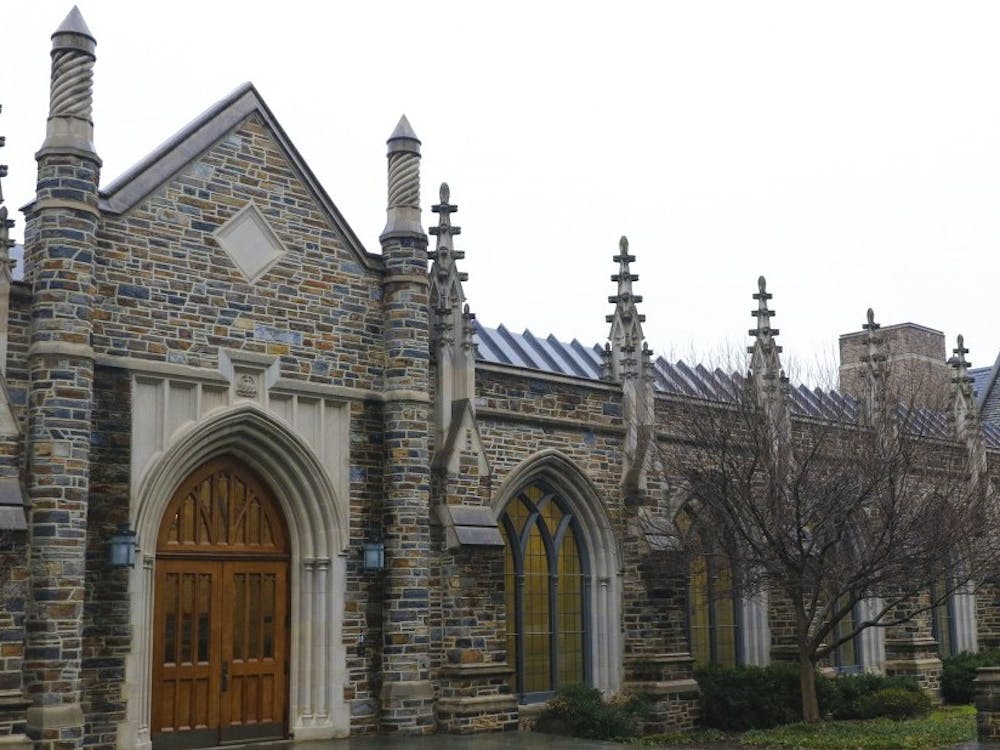From Title IX to personal data, policy changes were the main topic of discussion for the Academic Council this week.
The council convened in a Thursday Zoom meeting to discuss the impacts of Title IX regulatory policy changes and proposed revisions to Duke’s data policy pertaining to human subject. The meeting featured a discussion of the University’s definition of sexual harassment and how easy the standard is to meet.
Kimberly Hewitt, vice president for institutional equity, presented on how changes to Title IX impacted the section of Duke’s Faculty Handbook involving the faculty hearing process.
Secretary of Education Betsy DeVos published revised Title IX regulations May 6, and gave universities until Aug. 14 to implement the changes. At Duke, students raised concerns that there had been a lack of transparency and community engagement in the implementation process, with only two days for public comment after Duke widely announced the new rules.
Hewitt noted at Thursday’s meeting that the short period of public comment at the end of the summer had been “crunched for time” and the University planned to post the policy and procedures again for public comment in the beginning of next year after seeing “how one or two of these cases really operates.”
Hewitt said that the government’s revised policy presented a narrow definition of sexual harassment that includes a “small category of kinds of cases” subject to new regulatory architecture. This “narrow definition” included “unwelcome conduct that is severe, pervasive and objectively offensive such that it would deny a person access to Duke programs and activities,” which Hewitt said was a narrower definition of sexual harassment than the one the University uses in its regular processes.
She added that the definition includes only cases directed against someone in the Unired States and within a Duke program or activity, and includes quid pro quo harassment as well as sexual assault, stalking, dating violence and domestic violence as defined in the Violence Against Women Act. Notably, the definition also applies to cases where faculty and staff are accused, leading to changes in the Duke Faculty Handbook, Hewitt noted.
“Historically, we didn’t have some of these requirements in the faculty/staff context,” Hewitt said. “They now require a live hearing with cross examination and an appeal before anything might get into the faculty committee hearing process.”
Regarding Appendix N—which describes the faculty hearing process—Hewitt noted that no challenge can be made to the final determination of Title IX procedures related to the government’s new definition. She added that any outcome that is specifically connected to remediation of the complainant cannot be challenged in the faculty hearing committee process, but any other non-remedial or non-disciplinary sanctions can be addressed via that process.
Hewitt added although the new Title IX regulations “dispensed with” obligations to report, many universities including Duke considered how to socialize and educate the community about “who needs to bring information forward” and confidential resources. She said that based on comparisons to peer institutions, Duke decided that “all faculty should bring information forward” in a consultation with the Office of Institutional Equity and especially encouraged non-supervisory employees and students to consult with OIE.
Asked how Duke’s definition of sexual harassment compared to peer institutions like Stanford University and the Massachusetts Institute of Technology, Hewitt said that Duke’s definitions are “clearly looser than the Title IX ones” and more broad than universities like MIT, including cases involving single instances of severe sexual harrasment.
“On the spectrum, it would be hard for me to give definitive answers on that, but I would say ours [are] more on the generous side than on the narrow side,” she said.
Nan Jokerst, J. A. Jones distinguished professor of electrical and computer engineering, noted that when contrasted to Stanford’s “hostile environment” definition for sexual harassment, Duke’s definition seems more difficult to to meet.
Hewitt responded that legally, the definition of “hostile environment” matches Duke’s definition of “unwelcome conduct of a sexual nature that is severe, pervasive or persistent.”
Associate General Counsel Neera Skurky added that specifically defining hostility could tread into the First Amendment space, so the University has tried to “track the legal definition.”
Jokerst responded that although tracking the legal definition is important, “as a non-legal person,” reading both Stanford’s and Duke’s definitions for sexual harassment makes Duke’s seem to be “a more difficult standard for an individual who is suffering from sexual harassment.”
“Although the term as a legal definition of hostile environment may reflect our definition, from a community perception standpoint, they do read very differently,” Jokerst said.
Human subject data policy
Lawrence Carin, James L. Meriam distinguished professor of electrical and computer engineering, announced proposed revisions to the University’s human subject data policy, due to the increasing recognition of the importance of human subject data for data science and machine learning.
The policy, written by an ad hoc group within the Duke University Health System, constituted principles to license data and how funds would be distributed if revenue is generated from the data.
In other business
The council also heard from Professor of Medicine Laura Svetkey and Professor of Law Thomas Metzloff, the University’s ombudspeople. Svetkey, the ombudsperson for the School of Medicine faculty, and Metzloff, the ombudsperson for University faculty, revealed trends showing a significant increase in the number of ombud cases in April and the early summer due to the COVID-19 pandemic.
Get The Chronicle straight to your inbox
Signup for our weekly newsletter. Cancel at any time.

Mona Tong is a Trinity senior and director of diversity, equity and inclusion analytics for The Chronicle's 117th volume. She was previously news editor for Volume 116.

